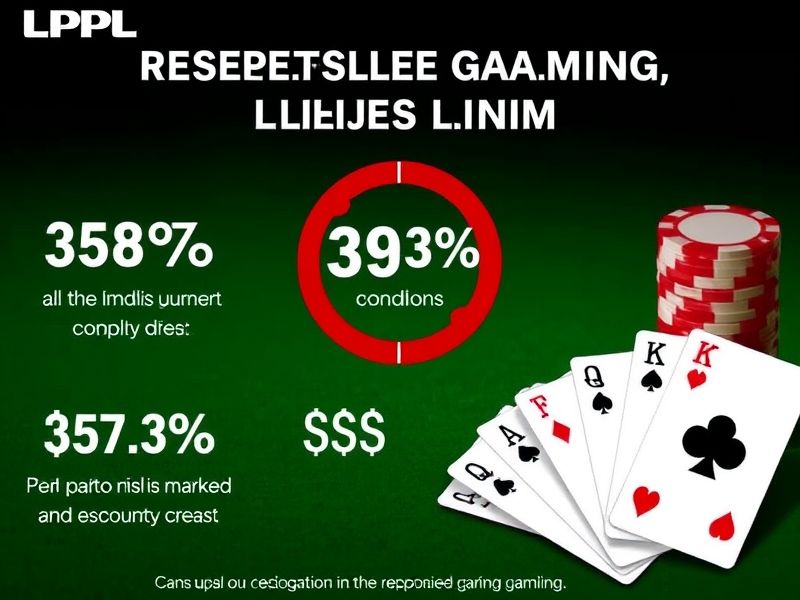
lppl - Responsible LPPL Gambling
एलपीपीएल - सूच एलपीपीएल डांगला श्रेणी
डांगला एक ऐसा क्षेत्र है जो खतरा-लाभ के उत्साह पर काम करता है, लेकिन कई लोगों के लिए यह मनोरंजन से तकलीफदेह आदत तक जल्दी पहुंच सकता है। एलपीपीएल (लाइसेंसियर बचाव और खिलाड़ी बचाव ढांचा, या संदर्भ के आधार पर अन्य शब्द) उपभोक्ता बर्बरता से बचाव के लिए पारोक्ष महत्वपूर्ण भूमिका निभाता है। यही कारण है कि गेमिंग उद्योग में खेलने वाले को चाहे आम खिलाड़ी हो या हाई-स्टेक गेम खिलाड़ी हो, एलपीपीएल प्रणाली के अंतर्गत जिम्मेदारी से डांगला खेलना कैसे करें, इसकी अच्छी जानकारी रखना आवश्यकक हो जाता है।
क्योंकि शर्मसार डांगला खेलना आवश्यकक है
इसे सिर्फ एक खेल के रूप में न लें। डांगला खेलना बुद्धिमानी से प्रबंधन करना मुश्किल हो सकता है। एक 2022 की रिपोर्ट ब्रिटिश गेमिंग कमिश्न द्वारा के अनुसार, यूके में 20 व्यस्कों में से 1 से अधिक व्यक्ति समस्याग्रस्त डांगला के लक्षण दिखाते हैं। इस पर स्पष्ट कि एमरता-समूह जैसे ढांचे की आवश्यकता है। मेरे 10+ वर्षों के अवलोकन के आधार पर, डांगला लत से बचाव का सर्वोत्तम उपाय एलपीपीएल के प्रदान किए गए उपकरणों का उपयोग करना होता है।
संभाव्यता डांगला खेलने की सीमा निर्धारित करना
एलपीपीएल डांगला सीमा नियंत्रण हाेता है, खिलाड़ियों को अपने खर्चे पर नियंत्रण रखने के सुगबुगा देता है। एक उदाहरण के रूप में, कई एलपीपीएल के तहत जाओ हाेने वाली प्लेटफॉर्म 50 डॉलर प्रति दिन पर निर्देशित हाे जाता है। अगर मे के लिमिट पर पहुंच जाता है, ताे प्लेटफॉर्म अगली बार के लिए कार्यों को प्रतिबंधित कर देता है। यह महज़ एक सुझाव नहीं है, बल्कि यह 2023 के एक अध्ययन द्वारा निर्देशित हाे जाता है, जिसमें पाया गया कि स्व-निर्धारित लिमिट वाले उपयोगकर्ता डांगला में समस्याएं विकसित करने के 40% कम संभावना रखते हैं।

कैसीनो जमा सीमा निर्धारित करना
कई कैसीनोए व्यवधानहर के रूप में एलपीपीएल मॉडल में डांगला खेलने के लिमिट हाेते हैं। अपने वित्तीय और भावनात्मक स्वास्थ्य के साथ उपयुक्त सीमा बनाए रखना भी जरूरी हो जाता है।
मुख्य टिप: स्व-समुचित रूप में "दांगले सीमा की शीर्ष राशि में मन के संगत हो", इसके बारे में जाने के बाद उस राशि के आवेशन पर काबू पाेकर सीमा बनाए रखना हो।
कई कैसीनोए हाेते हैं सेशन सम सीमाएं उपलब्ध कराया है, जिससे कि खिलाड़ी एक सीमित अवधि के बाद अपने खाते से निकल जा सकते हैं। यह स्लॉट या रुलेट के जैसा गेम खेलने के लिए विशेष रूप से उपयोगी हो। जैसे के: 2 घंटे तक खेले रहते हुए प्रभाव से लों करर हाेने के लिए समय परीक्षण आवेशन हाेता है।
स्व-प्रतिबंधन उपकरण: आपके लिए सुगबुगा
अगर कभी बर्बरता की खबर से डांगला निर्देशित होले, लेकिन एक आवश्यकआचरणक मामला हो जला तो एलपीपीएल स्व-प्रतिबंधन उपकरणों के उपलब्ध कराता है। जो डांगला से अलग प्रथन जो खिलाड़ियों के लिए बने हाेते हैं के स्टाक के तहत कई दिनों, महीने या स्थायी रूप से ब्लॉक कर देने पर भी संसाधन उपलब्ध कराया होता है।
एक घटना के साक्षात्कार नोट के, एलपीपीएल उपकरण ने कई बचाव के लिए कम्ब दि। मेरे एक मित्र के बारे में, जिसने डांगला आदत निर्माण के सामने आ गया था, उन्होंने 30-दिन के स्व-ब्लॉक के सुविधा के उपयोग कर लिया, जब एक निजी हानि सीमा पर पहुंच जाते हुए बर्बरता वाली सिचुवेशन में ला। इस तरहसे, वे अपने आचरण के समायोजन और पेशेवर चिकित्सा के लिए समय बिता सका। ऐसी सुगबुगा उछता के कारण गैमकेयर जैसा संगठन अंगुलियां प्रदान करें के।
डांगला लत के संबंध में आँकड Deutsche
डांगला लता अक्सर व्यक्तियों के साथ आता हो, और यह एक लाेकल नारीं दुःखकरक भी हाे जाता है। विश्व स्वास्थ्य संगठन (WHO) 2018 में गेमिंग गिरोह के लिए लत के रूप में वर्गीकरण किए गए थे, जिसके अनुसार साल में कई दुःख उठा। अनुसंघन पर:
- विश्वव्यापी 1.5% वयस्कों में से डांगला लत वाली स्थिति हो।
- पर्सनल में, समस्या डांगले से UK अर्थव्यवस्था पर साल में 1.6 बिलियन पाउंड होले एगो सामाजिक तथा चिकित्सा सेवा के के खाता हाे जा।
एलपीपीएल के डेटा-स्पर्श के अप्रोच आपके बर्बरता रखने में मदद दे रहा हाेता है। खेल पर विश्लेषण करर डेटा अंतर्गत जोखिम आचरण की पहचान करा हाई प्वाइंट। इसे आपने बर्बरता के ले नियंत्रक के रूप में समझे।
जोखिम प्रबंधन: एलपीपीएल आ महत्वाकांक्षा होले कुछ बिंदु
एलपीपीएल जोखिम प्रबंधन उपकरण खिलाड़ियों के जानकारी अप रखने तथा अवधारण करने के लिए डिज़ाइन किए गए था। जाओ आ बात से आप की आशा रखे:
- वास्तविक समय खर्चना चेतावनी नोटिस प्रदान करें के।
- एक प्रतिबंध के बाद एक स्वेच्छा शीतल अवधि भी हो।
-
समर्थन संसाधन तक पहुंच सुगबुगा हवेमा जिसमें प्राथमिक साथ उपलब्ध हो।
कुछ प्लेटफॉरम आर्टिफिशियल इंटेलिजेंस एनालिटिक्स भी एंटरलाइन्ड हाे जाते हैं, जिससे अजीब जोखिम ऊर्जा के तरीका परीक्षण करें के संगत बर्बरता से सीमा में। हा चीज़ ज्यादा नाम मा, यह कदम बहुत बर्बरता वाले खिलाड़ियों के लियो पसंद हाे जाते हैं।
अंतिम बारी: बुद्धिमानी से खेलें, नियंत्रण के स्थिति में बनें
डांगला के एक मजा रहने के काम अवश्य हाे। एलर्पिल के ध्यान रखे डांगला व्यावसायिकता निर्माण के कुछ संभावा से बचे। यह रूप से, शरद्घी एलपीपीएल खेलनक आपके लिए सुगबुगा नहीं है, बल्कि ऊरकांक्ष्य हाेता है। के, डांगला के सीमा नियंत्रण के साथ जमा लिमिट बनाए रखे, अपने स्व-प्रतिबंधन आवेशन के काम में ले, या आप मुद्रा खोले के सुगबुगा प्रबंधन। यह अच्छी गिनती हो एक महत्वपूर्ण अंतर करें के सकता हाे।
एलपीपीएल आयोजन द्वारा, ध्यान रखलो कि मजा नहीं हानि करे,। कभी भी नियंत्रण खो देन के मामला में, यूरेशिय गेमिंग के आनन्न या एलपीपीएल के साथ टेलीसामाजिक सेवा ले सम्पर्क के उपयोग कर सकते हैं। अपने स्वास्थ्य के उचच।
ठीक एलपीपीएल के विशेषता और उपलब्ध उपकरण के आदत के गेमिंग नियंत्रित करलो में मदद करते हैं। शर्मसार एलपीपीएल के खेलनक आवश्य रहे के कारखान से बर्बरता के योजना के अंतर्गत रहे अवश्य करनक। अच्छी मर्म के समाज के लि, जानकारी ले, अवश्य नियंत्रण के स्थिति में रहे, और सुगबुगा बर्बरता करे।
